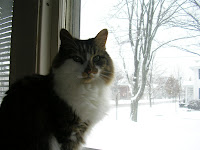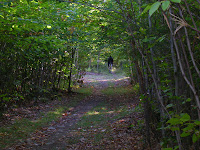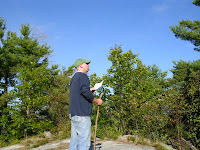When I was in the eighth grade, Mr. Whitney told us, "If you are assigned a book you've already read, don't mention it to the teacher. Read it again; you'll always find something new." Mr. Whitney was probably my most influential English teacher, whom I had in the sixth and eighth grades. He had a book shelf of classic novels (which he had bought), and we could choose one every two weeks to read and report on. He read out loud to us often, wrote as many helpful comments on as we wrote words in our writing assignments, and introduced us to Messrs.
Strunk and White. He loved baseball, Thomas Jefferson, and good books, and he was definitely right about the rereading thing.
Generally, as soon as I've read a book, I know whether I'll reread it, and that drives me to purchase my own copy. I'm currently rereading
The Chronicles of Narnia. I have
two of the old paperback sets from 1970. You know
them: The cover art is tacky, but I won't upgrade because they are in
the proper order. I know some of you will disagree with me on this, but the magic starts in the wardrobe (I wrote my senior thesis partly on that, so I've devoted plenty of thought to the matter). When Ickie nags me about having two sets, I always answer, "One is mine, and one is for the children." (I think he assumes he'll have to share the second set with our fictional children.) I've reread these books more often and for longer than any others (since I was in the third grade), and they always fill me with joy and make me cry. Here are a few snippets I've enjoyed this time around.
A New Discovery: The
Bastables are mentioned on the very first page of
Magician's Nephew. The last time I read these, I wasn't yet familiar with Nesbit's Bastable children.
"In those days...the Bastables were looking for treasure in the Lewisham Road."
Droll Asides: I adore the way Lewis speaks directly to the reader to add in his own snide opinions. There are many instances, but my favorite one is in Dawn Treader.
"...when the Pevensie children had returned to Narnia last time for their second visit, it was (for the Narnians) as if King Arthur came back to Britain as some people say he will. And I say the sooner the better."
Residual Damage: If you've read Lewis's
autobiography, you know that as a timid, bookish little fellow he was tormented by bullies at public school (boarding school). Ickie and I always appreciate his scathing description of Experiment House in
Silver Chair. However, I don't recall noticing before how he attributes some of Edmund's behavior to public schooling in
LW&W.
"When at last she [Lucy] was free to come back to Edmund she found him standing on his feet and not only healed of his wounds but looking better than she had seen him look--oh, for ages; in fact ever since his first term at that horrid school which was where he had begun to go wrong. He had become his real old self again and could look you in the face."
It makes me feel sorry for poor little Jack.
Close Encounters: 
I suppose if I can't get into Narnia myself, a trip to England must suffice.
"...just on this side of the stream lay the Lion. It lay with its head raised and its two fore-paws out in front of it, like the lions in Trafalgar Square."
The Trafalgar Aslan is the right size too, unlike the too-small one in the movie.
Views on Marriage: Lewis's little summing up of mutual attraction at the end of
Horse and His Boy cracks me up.
"Aravis also had many quarrels (and, I'm afraid even fights) with Cor, but they always made it up again: so that years later, when they were grown up they were so used to quarreling and making it up again that they got married so as to go on doing it more conveniently."
Happy Endings: Like Tolkien, Lewis is adept at tying adventures up in that tidy, charming English manner. Here's an example from
Silver Chair:
"In the inquiry all sorts of things about Experiment House came out, and about ten people got expelled. After that, the Head's friends saw that the Head was no use as a Head, so they got her made an Inspector to interfere with other Heads. And when they found she wasn't much good even at that, they got her into Parliament where she lived happily ever after.
Eustace buried his fine clothes secretly one night in the school grounds, but Jill smuggled hers home and wore them at a fancy dress ball next holidays. And from that day forth things changed for the better at Experiment House, and it became quite a good school. And Jill and Eustace were always friends.
But far off in Narnia, King Rilian buried his father, Caspian the Navigator, Tenth of the name, and mourned for him. He himself ruled Narnia well and the land was happy in his days, though Puddlegum often pointed out that bright mornings brought on wet afternoons, and that you couldn't expect good times the last. The opening into the hillside was left open, and often in hot summer days the Narnians go in there with ships and lanterns and down to the water and sail to and fro, singing, on the cool, dark underground sea, telling each other stories of the cities that lie fathoms deep below. If ever you have the luck to go to Narnia yourself, do not forget to have a look at those caves."
(I really think he's mocking me with that last bit.)
 3:10 to Yuma: Bravo to the return of the Western, especially starring Christian Bale and Russell Crowe. The enigmatic mutual friendship formed between bad guy and good guy was fascinating, and the scenes of southwestern mountains dusted with snow were breathtaking on the big screen.
3:10 to Yuma: Bravo to the return of the Western, especially starring Christian Bale and Russell Crowe. The enigmatic mutual friendship formed between bad guy and good guy was fascinating, and the scenes of southwestern mountains dusted with snow were breathtaking on the big screen. w this one last night, and it's even better than the trailers and reviews suggest. All the actors are perfectly cast, and I'm a sucker for a smart young outcast like Ellen Page who uses sarcasm to hide her vulnerabilities. It's a movie about mostly-decent people maturing and making the best out of bad circumstances; the endings, while not necessarily expected, are believable and heart-warming.
w this one last night, and it's even better than the trailers and reviews suggest. All the actors are perfectly cast, and I'm a sucker for a smart young outcast like Ellen Page who uses sarcasm to hide her vulnerabilities. It's a movie about mostly-decent people maturing and making the best out of bad circumstances; the endings, while not necessarily expected, are believable and heart-warming. g with Ellen Page in Juno and Christian Bale, Russell Crowe, and Ben Foster in 3:10 to Yuma, Ryan Gosling gives the best performance I've seen this year as Lars. This movie shows a family, church, and community wrapping its arms around a hurting individual, and it allows you to leave the theater believing people are pretty great after all.
g with Ellen Page in Juno and Christian Bale, Russell Crowe, and Ben Foster in 3:10 to Yuma, Ryan Gosling gives the best performance I've seen this year as Lars. This movie shows a family, church, and community wrapping its arms around a hurting individual, and it allows you to leave the theater believing people are pretty great after all.


























